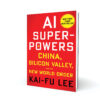There has been much discussion recently about China’s becoming a scientific and innovation superpower.
If, however, you accept the current narrative coming out of Washington, China is still a predatory economy built on products and technology stolen from the West. While it does have a history of stealing technology and copying products, this narrative overlooks the fact that China today is moving quickly to assert dominance in a number of critical areas of science and technology.
Perhaps one of the most important of these is artificial intelligence or AI. The contest for leadership in this area is often portrayed as the next space race. The outcome is likely to have a major impact on the global economic and political landscape of the 21st century.
(Sponsored)

SnowBall 2026: A premier networking event with purpose returns to 50 Sussex Dr.
As winter settles in across the capital, one of Ottawa’s most high-profile charitable and business networking events is set to return to its roots: On Wed., March 4, 2026, The

SnowBall 2026: A premier networking event with purpose returns to 50 Sussex Dr.
As winter settles in across the capital, one of Ottawa’s most high-profile charitable and business networking events is set to return to its roots: On Wed., March 4, 2026, The
Kai-Fu Lee argues that this race essentially involves two major players: China and the United States. He suggests that other countries such as Canada, currently an important player in AI research, lack the AI venture capital ecosystems and the large user bases needed to generate the volumes of data required as AI moves from the research to implementation phase.
While the author acknowledges that the U.S. has been the global leader in AI to date, he predicts that it will be overtaken by China within a decade.

This is a book that merits reading by both business executives and policy-makers. It covers a lot of ground and provides some interesting and sometimes controversial insights into the entrepreneurial cultures of China and Silicon Valley. It also points to the need for government policy-makers to start considering how they will respond to the substantial economic and societal dislocation that AI’s implementation has the potential to cause.
Lee is well-positioned to comment on the future of AI and the competition among the leading players. A leading AI researcher, he is currently chairman and CEO of Sinovision Ventures, a tech-focused investment firm based in China. Prior to that, he was president of Google China.
His argument about eventual Chinese leadership in AI relates to the advantages he sees it having in four areas critical to winning the AI race. These are: abundant data, tenacious entrepreneurs, well-trained AI scientists and a supportive policy environment.
China’s major advantage as AI moves into the implementation phase is the abundance of data available to it.
The country currently has more than 800 million internet users, more than the U.S. and all of Europe combined. Sixty-five per cent of China’s more than 753 million smartphone users have enabled mobile payments, and Chinese e-commerce purchases are roughly double that of the U.S., a gap that is growing.
Data from mobile payments is generating rich consumer data which will give China a major advantage in developing AI-driven services. This includes data on users, their location, how they commute, what foods they like and where they buy. In addition, unlike many Western concerns about privacy, Chinese consumers are willing to give up privacy for convenience.
China’s second advantage is a growing number of well-trained AI engineers combined with generation of entrepreneurs who have been forged in one of the most cutthroat competitive environments on the planet. These will play a more important role than elite researchers as AI moves into the implementation phase with a focus on creating game-changing companies.
Finally, China’s government-led AI plan, which aims for the country to become the global leader in AI by 2030, includes research subsidies, venture capital investments and special development zones and incubators across the country. While Lee acknowledges that Chinese innovation policy is often wasteful and inefficient, he views it as ultimately being effective in achieving its objectives. In addition, he sees the country’s totalitarian political culture as paving the way for the faster implementation of this technology.
In the last few chapters, the author explores the potential negative economic, social and political impacts of the AI revolution. These include everything from less developed countries being deprived of the ability to kickstart growth through low-cost manufacturing exports to the creation of a bipolar world as AI puts disproportionate power in the hands of two nations to the potential for substantial job loss in developed economies.
AI is likely to be one of the most transformative technologies of the 21st century. This book is a good start to understanding how the race for leadership could play out and the potential consequences.
Micheál Kelly is dean of the Lazaridis School of Business and Economics at Wilfrid Laurier University in Waterloo and the former dean of the University of Ottawa’s Telfer School of Management






